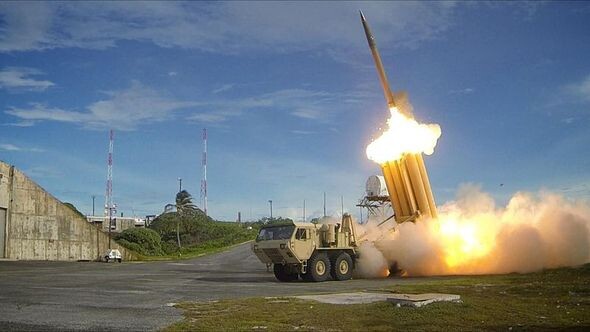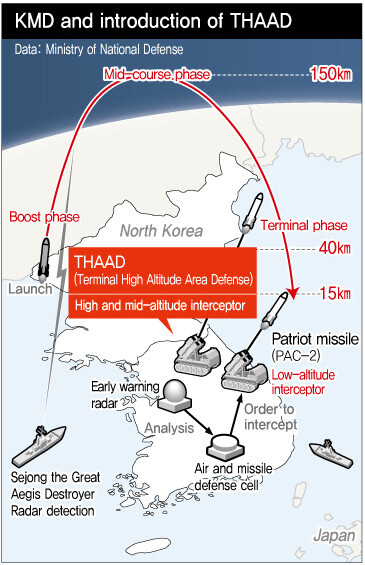hankyoreh
Links to other country sites 다른 나라 사이트 링크
[Editorial] Obeying the US on THAAD will only hurt national security

Once again, controversy is stirring over the question of whether South Korea will join the missile defense system that the US is initiating in Northeast Asia. The South Korean government is largely responsible for the controversy, since its ambiguous stance toward the American plan is allowing it to be dragged into the system. We urge the government to consistently and clearly express its rejection of the American plan to prevent such a misunderstanding.
US intentions were clear in remarks made in Tokyo on Feb. 20 by Anita Friedt, Principal Deputy Assistant Secretary for Nuclear and Strategic Policy at the U.S. Department of State, when she praised the Trilateral Information-Sharing Arrangement signed by the US, South Korea, and Japan in Dec. 2014. Friedt explicitly linked the arrangement to the development of a regional inter-operative missile defense system between the US, South Korea, and Japan.
Friedt’s comments imply that the missile defense system that South Korea is developing, known as the Korea Air and Missile Defense (KAMD), will be integrated with the missile defense system operated by the US and Japan.
Though the South Korean Ministry of National Defense denies the charge - on Feb. 21, a ministry official said that the use of the arrangement was limited to “sharing information about threats posed by North Korea’s nuclear weapons and missiles” - in the future, the arrangement could be bent to the Americans’ will. After all, the US is the country that spearheaded the agreement and that is organizing the sharing of information.
The South Korean government’s equivocal attitude is also apparent in the question of deploying the Terminal High Altitude Area Defense (THAAD) weapons system on the Korean peninsula.
The South Korean government insists that there have been no requests from or deliberations with the US about deploying THAAD. However, this claim has been called into question by several American military officers who have said that deliberations have taken place and that possible deployment sites have been surveyed.

Furthermore, South Korean military officers and members of the ruling party have made both direct and indirect comments in support of THAAD, arguing that deploying the system would aid the country’s national security.
What a cowardly position this is: officially denying that deliberations are taking place, while quietly preparing to give in if the US pushes hard for deployment.
While the ostensible target of the Northeast Asia missile defense system is the threat of North Korea’s nuclear weapons and missiles, the actual target is China, and THAAD, the most recently developed technology, is the key component of this system.
Missile defense also plays an important role in the US policy of “rebalancing Asia”, which the administration of US President Barack Obama is currently promoting to counter China.
When the Chinese Defense Minister officially expressed concern about the deployment of THAAD during a visit to South Korea at the beginning of this month, it confirmed once more that the missile defense question is at the heart of the confrontation between the US and Japan on one side and China on the other.
For South Korea to fan the flames of this confrontation by joining one side will not help find a solution for North Korea’s nuclear program or lay the foundation for the unification of the Korean peninsula, let alone promote peace in Northeast Asia.
The South Korean government must quickly discard its complacent assumption that obeying the US will guarantee national security. It must also review the information-sharing agreement starting from square one. The government needs to realize that the current resurgence of controversy about South Korea’s involvement in the missile defense system is itself damaging to the country‘s national security.
Please direct questions or comments to [english@hani.co.kr]

Editorial・opinion
![[Column] Season 2 of special prosecutor probe may be coming to Korea soon [Column] Season 2 of special prosecutor probe may be coming to Korea soon](https://flexible.img.hani.co.kr/flexible/normal/500/300/imgdb/original/2024/0426/3317141030699447.jpg) [Column] Season 2 of special prosecutor probe may be coming to Korea soon
[Column] Season 2 of special prosecutor probe may be coming to Korea soon![[Column] Park Geun-hye déjà vu in Yoon Suk-yeol [Column] Park Geun-hye déjà vu in Yoon Suk-yeol](https://flexible.img.hani.co.kr/flexible/normal/500/300/imgdb/original/2024/0424/651713945113788.jpg) [Column] Park Geun-hye déjà vu in Yoon Suk-yeol
[Column] Park Geun-hye déjà vu in Yoon Suk-yeol- [Editorial] New weight of N. Korea’s nuclear threats makes dialogue all the more urgent
- [Guest essay] The real reason Korea’s new right wants to dub Rhee a founding father
- [Column] ‘Choson’: Is it time we start referring to N. Korea in its own terms?
- [Editorial] Japan’s rewriting of history with Korea has gone too far
- [Column] The president’s questionable capacity for dialogue
- [Column] Are chaebol firms just pizza pies for families to divvy up as they please?
- [Column] Has Korea, too, crossed the Rubicon on China?
- [Correspondent’s column] In Japan’s alliance with US, echoes of its past alliances with UK
Most viewed articles
- 1Samsung subcontractor worker commits suicide from work stress
- 2‘We must say no’: Seoul defense chief on Korean, USFK involvement in hypothetical Taiwan crisis
- 3Is Japan about to snatch control of Line messenger from Korea’s Naver?
- 4Division commander ordered troops to enter raging flood waters before Marine died, survivor says
- 5[Editorial] Korea’s surprise Q1 growth requires objective assessment, not blind fanfare
- 6No good, very bad game for Korea puts it out of Olympics for first time since 1988
- 7US overtakes China as Korea’s top export market, prompting trade sanction jitters
- 8Korea’s 1.3% growth in Q1 signals ‘textbook’ return to growth, says government
- 9N. Korean delegation’s trip to Iran shows how Pyongyang is leveraging ties with Moscow
- 10[Column] Season 2 of special prosecutor probe may be coming to Korea soon